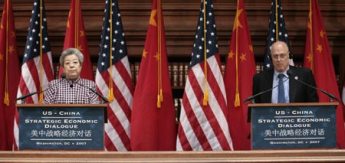January 17 and 18, China and the US held the third round of the Strategic Economic Dialogue in Beijing.
The SED is a cabinet-level series of summits began by President Hu Jin Tao and President George W. Bush in August, 2006 to address and smooth over Sino-American disputes such as those surrounding product safety and climate change.
The mid-January two-day dialogue was co-chaired by Chinese Vice Foreign Minister, Dai Bingguo and U.S. Deputy Secretary of State, John Negroponte. Though scheduled to exchange dialogue on steady-state matters such as ensuring the longevity of US-China relations through trade, the timing of this SED round served as a convenient platform to address one front-burning issue gaining steadfast momentum: Cross-Strait relations.
On the heels of Taiwan's parliamentary elections (held January 12), many saw this event as an opportunity for Beijing to dually:
1) Re-iterate to US the need to restrain Taiwan's calls for independence.
2) Send the message to Taiwan that US-China ties are being strengthenedDespite analyses that Beijing has accelerated activities (below) to alienate Taiwan prior to its elections, it seems China's efforts will ultimately have little impact over the election, as the Taiwanese seem to be voting toward domestic, economic, and social issues — and reportedly see little difference between the DPP and KMT, China's preferred opposition.
China's “activities” :
- Playing its contacts (foreign government officials, business leaders, academics, researchers) to
China's expectation that Taiwanese President Chen Shui-bian will leverage the election to declare independence with the 2008 Olympics in sight. (China is described as stating it would have “no choice but to respond to preserve the territorial integrity of China,” compelling several governments to express concern and back-up the bid to preserve the Cross-Strait status quo.) - Wooing Taiwan's remaining diplomatic allies. (With Malawi as an addition, it was reported Taiwan's foreign minister was left sitting in South Africa after having his visa denied without prior warning)
- Blossoming ties with the Marshall Islands, and Japan. (Oil and gas can buy friends)
- And now, SED III. (Strategically-placed maraschino cherry)
Conclusion (SED III). Negroponte was swift to jump on the wagon, firmly backing One-China, citing the UN membership referendum . . . the two sides agreed to look forward to common interest and strengthened cooperation at the Beijing Olympic Games, tra la la.) SED IV will take place later this year, on US soil. We’ll likely be seeing much more on The Motherload, Cross-Strait.
Standby!
